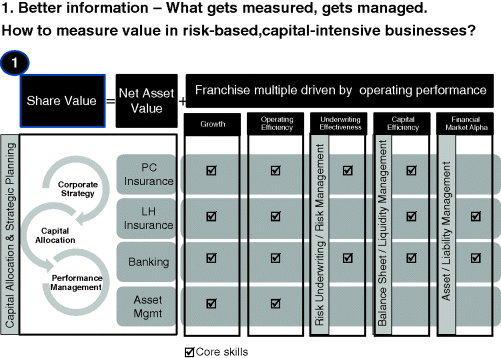Chapter 1Why is Value Management Important?
CFOs and CROs have significant potential to influence the value of their firm through three channels.
- First, by providing better information in the form of RAPMs,1 which link management actions directly to shareholder value.
- Second, by challenging businesses to higher levels of performance through better insights, including segment-specific strategies and management actions.
- Third, by taking better decisions in their own areas of responsibility, especially corporate strategy, capital allocation, balance sheet management and risk management.
This chapter motivates the importance of these three levers in managing the value of the company from a CFO and CRO's perspective.
Better Information
The first objective of this Handbook is to develop a value and performance measurement framework which can be used by managers at all levels to set strategy and steer risk-based, capital-intensive banking and insurance businesses. The valuation framework, illustrated below, splits the value of the firm between its current net asset value (or the market value of its current assets less its liabilities) and its franchise value (reflecting future, profitable new business).
Figure 1.1 is used throughout the Handbook to represent the three value levers available to CFOs and CROs – better information, better insights and better decisions.

Get Value and Capital Management: A Handbook for the Finance and Risk Functions of Financial Institutions now with the O’Reilly learning platform.
O’Reilly members experience books, live events, courses curated by job role, and more from O’Reilly and nearly 200 top publishers.

